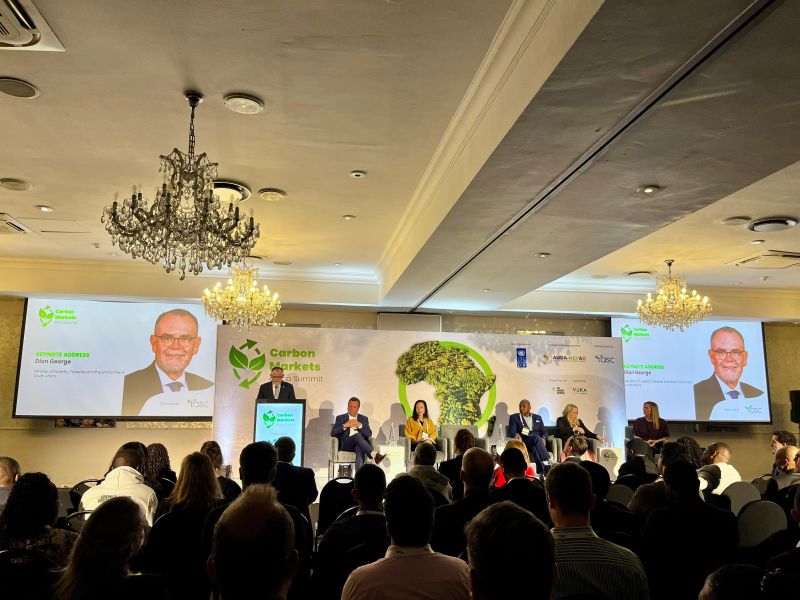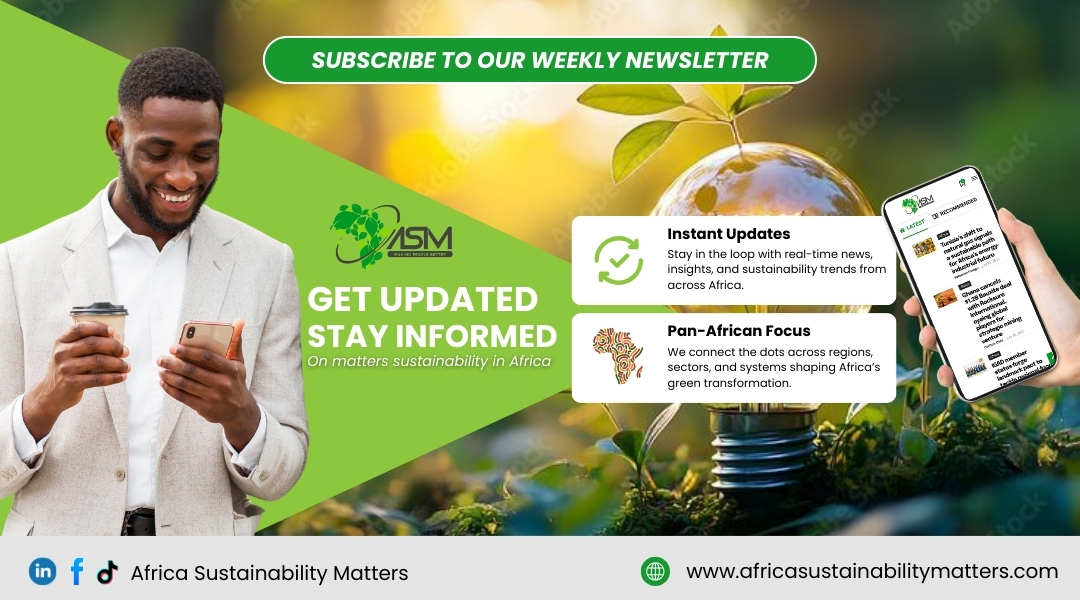Table of Contents
The just-concluded Carbon Markets Africa Summit 2025 (CMAS) in South Africa marked a defining moment for the continent’s climate finance journey; one where ambition met structure and Africa’s carbon economy began to take tangible form.
Over two packed days of keynotes, high-level panels, and investor dialogues, one message echoed through the halls: Africa’s carbon market era has officially begun, but its credibility will depend on integrity, inclusion, and transparency.

Dr Dion George, Minister of Forestry, Fisheries and the Environment of the Republic of South Africa, addressing delegates at CMAS. Image source: VUKA Group
At the heart of this year’s summit was the unveiling of South Africa’s Draft Carbon Markets Framework and Draft Carbon Credit Revenue Plan, presented by Minister Dion George. The two policy drafts are designed to strengthen confidence in Africa’s carbon ecosystem by embedding strong verification, reporting, and benefit-sharing mechanisms.
“One credit, one use, one count, no double counting, no overselling, no ambiguity,” George told delegates, drawing a standing ovation.
The framework is expected to provide a unified approach to credit generation, ownership, and taxation, crucial in a region where the voluntary carbon market has grown by over 40% since 2022, but where policy fragmentation continues to slow investment flows.
Policy meets practice
Day One of CMAS 2025 explored the intersection between global climate commitments and Africa’s national carbon ambitions, with discussions centered on aligning domestic markets with Article 6 of the Paris Agreement. Speakers from Ghana, Kenya, Nigeria, and Zambia presented updates on how their governments are embedding carbon finance into national climate strategies.
Read also: OPEC fund commits $31 million to boost energy and food security in Chad
Panelists underscored that carbon markets cannot succeed without trust, both among governments and between developers and the communities who host projects. Several case studies presented showed that carbon projects which directly channel at least 30–40% of revenue to local livelihoods not only perform better but also maintain certification longer.
Delegates also discussed the role of digital verification and AI-based MRV (measurement, reporting, and verification) systems in tackling credibility gaps that have previously undermined Africa’s participation in global carbon exchanges.
From policy to projects
The project showcase sessions brought the technical discussions to life. Developers from Nigeria, Ghana, Zambia, and South Africa presented on-the-ground initiatives spanning reforestation, blue carbon, and renewable energy transitions.

One highlight came from a Zambian forestry project that has restored over 20,000 hectares of degraded land while generating verified carbon credits traded under Verra’s new transparency rules. Another presentation from Ghana detailed a community-driven mangrove restoration initiative that employs 1,200 women across coastal villages and is expected to sequester more than two million tonnes of CO₂ over the next decade.
For investors, these were not just environmental stories, they were models of scalable, bankable climate action. The summit’s investor roundtables explored how blended finance, carbon insurance products, and revenue-sharing models could unlock billions in private capital for similar projects.
Read also: Ethiopia deepens Russia ties with World Trade Organisation bid and nuclear power plans
Finance and fairness
Day Two deepened the financial lens. With Africa attracting less than 5% of global voluntary carbon market flows, CMAS participants debated how to change that narrative. The consensus: policy predictability and credible data are prerequisites for confidence.
Representatives from the African Development Bank (AfDB) and UNDP emphasized the need for a regional carbon registry that integrates domestic initiatives and aligns them with international standards. The goal, they said, is not only to attract global investment but to ensure that African carbon credits are priced fairly, reflecting their social and biodiversity co-benefits.
Workshops on blue carbon and urban decarbonization highlighted emerging frontiers, from seagrass restoration to low-carbon city planning. The sessions drew attention to Africa’s coastal economies, where more than 116 million people depend on marine ecosystems for livelihoods, making blue carbon one of the most promising areas for future credit generation.
Partnerships and the path ahead
As the Summit closed, the tone was one of cautious optimism. The final plenary outlined clear priorities for 2026:
- Harmonize national policies ahead of COP30, ensuring that carbon credit systems across Africa speak the same language.
- Expand capacity building for local project developers and environmental authorities.
- Promote Africa-led certification systems to complement existing global registries.
Participants also called for mechanisms to monitor how carbon revenues are shared with communities, ensuring that Africa’s carbon trade does not replicate the extractive models of the past.
The Summit’s closing reflections stressed that the success of Africa’s carbon markets will depend on collaboration between government, private sector, and civil society. “Finance follows trust,” one panelist noted, “and trust follows transparency.”
Building integrity into Africa’s carbon future
From its technical panels to its networking sessions, CMAS 2025 demonstrated how far Africa has come in understanding the carbon economy not as a niche financial tool, but as a pillar of climate-resilient development. With South Africa, Kenya, and Ghana emerging as policy trailblazers, the focus is now shifting toward implementation, turning frameworks into functioning markets.
One of the standout moments of the summit was the panel discussion “Road to COP30: Aligning Africa’s Carbon Strategy with Global Agendas.” Moderated by Lincoln T., Board Advisor at ZERO13, the session explored how Africa can align its carbon strategies with global frameworks such as Article 6 of the Paris Agreement while ensuring that international standards reflect local realities. Featuring Dr. Olufunso Somorin of the African Development Bank, Heather McEwan of Verra, Kwame Ababio of AUDA-NEPAD, and Lorna Ritchie of the Integrity Council for the Voluntary Carbon Market, the discussion emphasized Africa’s need for a united voice ahead of COP30, one that balances integrity, inclusivity, and investment to shape a fair global carbon market.
The handover of recommendations to COP30 representatives signaled Africa’s growing assertiveness in global carbon diplomacy. By framing integrity and community benefit as non-negotiable pillars, the Summit set a tone that could reshape global carbon trade norms.
Read also: Kenya Airways flies first African route, from Nairobi to Cape Town, on sustainable fuel
For Africa, the next step is ensuring that every credit issued represents real climate progress, measurable, verifiable, and meaningful for the people on the ground.
As the curtain fell on CMAS 2025, one sentiment united policymakers, investors, and activists alike: the continent’s carbon market future will be defined not by how much carbon Africa sells, but by how much integrity it keeps.
Engage with us on LinkedIn: Africa Sustainability Matters



